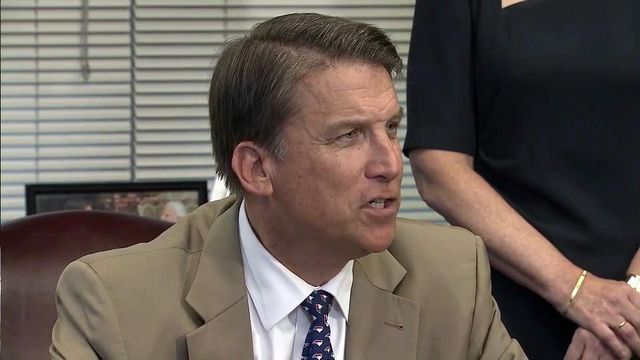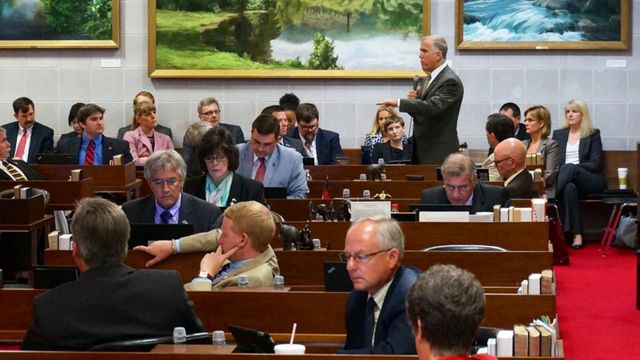State budget nears passage
Hours after the state Senate gave its final approval to a $21.1 billion compromise budget, the state House voted 68-46 Friday to tentatively approve the spending plan.
Posted — UpdatedA final House vote is expected Saturday, and the budget would then go to Gov. Pat McCrory, who said Friday afternoon that he would be "proud" to sign it into law.
"There were several issues that I refuse to compromise on, and I'm pleased to say that this budget falls within the parameters where I do not need to veto this bill," McCrory said during an afternoon news conference.
The governor had twice threatened a veto in recent weeks if the final proposal raised teacher salaries so much that it required cuts to Medicaid eligibility and to funding for elementary school teaching assistants.
"This is a victory for the people of North Carolina and a victory for continued for economic growth. In addition, it's a victory for education," he said.
The budget is a month late, and the same issues that led to contentious negotiations between the House and the Senate in recent weeks surfaced on the House floor Friday during three hours of sometimes acrimonious debate.
The legislation includes $282 million for teacher pay raises, which Republicans have characterized as the largest increase in state history, but Democrats say the claim is inflated.
"Every teacher in every school will make more money than they did last year," said Rep. Craig Horn, R-Union.
Teacher groups have complained in recent days that longevity pay given to teachers with more than 10 years of experience was rolled into the raises, so the pay increases aren't as large as they're made out to be.
"You can't take their longevity pay and give it back to them and say it's a raise," said Rep. Larry Hall, D-Durham. "Our teachers are in education for a reason – they can figure it out."
In his news conference, McCrory broke the raise into two parts, calling it an average 5.5 percent increase, plus longevity pay.
Hall, the top Democrat in the House, described the spending plan as "a 90-day budget," suggesting it allows the Republican majority to get through the November election campaigning on teacher raises while putting off the thorny issues of Medicaid reform and cleaning up coal ash ponds statewide until later.
Rep. Bryan Holloway, R-Stokes, noted that not passing a budget means teachers get no raise and remain among some of the worst paid in the nation.
Some Democrats thanked the Republicans for working hard for the teacher raises, but they noted the budget adversely affects education spending in other areas, such as cutting the budget at the state Department of Public Instruction and raising tuition at community colleges.
Rep. Rick Glazier, D-Cumberland, cited the loss of extra pay for teachers with master's degrees, the elimination of the Teaching Fellows program and the repeated threats to the tenure rights of veteran teachers in calling the GOP stance to education "an unrelenting fatwah."
"Why do we seem to be out to get our educators?" asked Rep. Alma Adams, D-Guilford.
Republicans scoffed at such claims, saying the old pay scale was set up to keep older teachers in the classroom and that the state now faces a shortage of younger teachers. The new system is simply trying to fill that hole, they said.
"This budget doesn't solve all of the problems with education, but it gives us a strong foundation for the future," House Speaker Thom Tillis said.
Democrats also criticized the cuts to Medicaid reimbursements to health care providers, noting the financial pressure that puts on rural hospitals. They cited the recent closure of a small hospital in Belhaven, which officials in eastern North Carolina have blamed for at least one death.
The discussion of Medicaid cuts elicited a brief shouting match over the impact of the Affordable Care Act on rural hospitals, and the tense atmosphere brought pleas for civility from some lawmakers.
"Let's ratchet down the rhetoric," said Rep. Marilyn Avila, R-Wake. "We've lost the ability to be statesmen, and we've become politicians, partisan politicians."
"We promised to do the best for the citizens, regardless of our (political) labels. They all deserve our best, and I'm not so sure we're doing that right now," said Rep. Marvin Lucas, D-Cumberland.
McCrory suggested that the minority party, currently the Democrats, routinely put together their own budget and roll it out for public discussion instead of just complaining about the plans developed by the party in control.
Democrats blamed the tax cuts the General Assembly passed last year for tying lawmakers' hands in the current budget, saying there wouldn't be a need to make other cuts to give teachers raises if high-income earners and corporations weren't given tax breaks.
"We created a tax system that's just not working," Hall said. "You keep doing what you're doing, and you get the same results."
Rep. Julia Howard, R-Davie, the chairwoman of the House Finance Committee, voted against the budget, saying she feared revenue wouldn't keep pace with growing demands in the coming years, putting the state budget on precarious footing.
"It's a great budget, but I have grave concerns we can't sustain it," Howard said.
Rep. Nelson Dollar, R-Wake, the chief budget writer in the House, said the tax cuts – and other budget adjustments made during recent years – were necessary to rebuild the state budget and move the economy forward. He compared the state revenue situation Republicans inherited in 2011 to the rusted out hull of a ship, where all of the damage was hidden below the water line.
"The truth will get out about this budget, and people will like it," Tillis said.
Three other Republicans voted against the budget, Reps. Robert Brawley of Iredell County, Mitch Setzer of Catawba County and Harry Warren of Rowan County. No Democrats voted for it.
Noting the late date of the budget, McCrory called for a constitutional amendment to set a firm end date on all legislative sessions. He also expressed displeasure with the numerous police proposals in the budget that aren't related to spending – shifting control of the State Bureau of Investigation, for example.
Related Topics
• Credits
Copyright 2024 by Capitol Broadcasting Company. All rights reserved. This material may not be published, broadcast, rewritten or redistributed.






